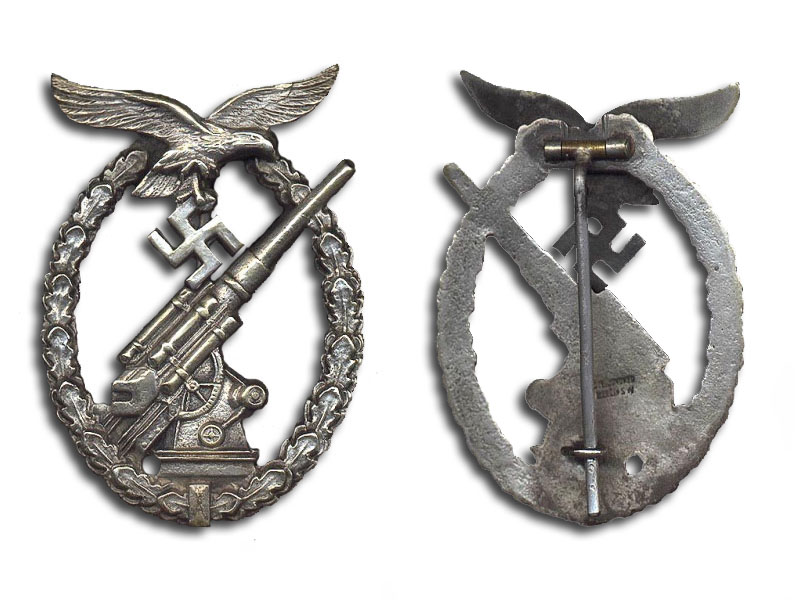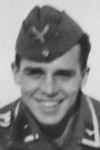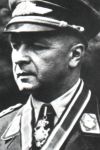Flakkampfabzeichen der Luftwaffe
The "Flakkampfabzeichen der Luftwaffe" (Anti-aircraftmedal) was established by Hermann Göring, January 10th, 1941 to decorate anti-aircraft guncrews of the Luftwaffe. Crews of searchlights and listeningposts were also eligible for this decoration. The medal was primarily awarded by a system of points and 16 points were required to be eligible for this decoration.
The medal was designed by W. Peekhaus from Berlin and was produced by numerous factories. The medal consists of a wreath of 8 bundles of 3 oak leaves each with an oblong at the bottom of the wreath. The oblong is tapered in the middle and the first oak leaves sprout from the bottom of the oblong. An eagle in flight is mounted at the top of the wreath and is holding a large swastika in one of its claws. The main motive is a large and very detailed 88mm anti-aircraft gun. This gun is trained upwards to the right and the barrel permeates the 7th bundle of oak leaves on the right side of the wreath. The medal is 2.48" high, 1.77" wide and the width of the wreath is 0.23". The reverse of the medal is flat with a standard pin and hook construction.
The medal was produced from various metals; medals made of aluminium being the rarest and made of zinc or a zinc alloy the most common. If the medal is marked with the logo or the LDO number of the producer, then this is engraved on the reverse of the medal. To prevent damage during action, a textile version to be worn on the battleuniform was produced from 1942 onwards.
Some well known manufacturers are Gustav Brehmer from Markneukirchen, C.E. Juncker from Berlin, F.W. Assmann & Sons from Lüdenscheid, Walter & Henlein from Gablonz and the Brothers Wegerhoff from Lüdenscheid.
The medal was presented in a small blue box or a standard paper bag with the name of the decoration stamped on it. The blue box has an blue inner lining made of satin. The name of the decoration is stamped on top of the lid in silver characters. A standard citation was presented with the decoration and the award was noted in the Soldbuch. The medal was worn on the lower left breastpocket below the Iron Cross 1.
Awarding of the medal was based initially on a system of points and the recipient was to have gained 16 points before becoming eligible for the medal. Crews of searchlights and listeningposts were also eligble for the medal and for them, each discovery of a hostile aircraft equalled 1 point. The following system was set up for guncrews:
-Downing of a hostile aircraft without the help of another gun, 4 points,
-Downing of a hostile aircraft with the help of another gun, 2 points,
Early 1942, this system was substituted by the following:
- 5 unsuccesful actions against hostile aircraft,
- 3 actions, resulting in the downing of a hostile aircraft,
- each action of exceptional courage concerning anti-aircraft defence,
- 3 succesful actions against ground targets (shipping, tanks, fortifications),
- The commander of the guncrew became eligible for this decoration provided half of his crew had been awarded the medal.

| Name | Date of birth | Date of death | Awards | |
|---|---|---|---|---|
| Petersen, Fritz | 29-11-1909 | 01-09-1946 |       | |
| Pfaff, Jakob (Feld-Flak-Abteilung 253) |     | |||
| Pickert, Wolfgang (General der Flakartillerie) | 03-02-1897 | 19-07-1984 |       more more | |
| Pimmingstorfer, Rudolf | 08-04-1914 | 28-06-1944 |       | |
| Pirhofer, Ernst | 12-01-1922 | 18-02-1991 |     | |
| Pirmann, Adolf | 08-01-1895 | 24-02-1985 |       more more | |
| Poehlmann, Hermann | 30-03-1915 | 03-10-2002 |      | |
| Pohl, Ritter von, Max (General der Flieger) | 15-04-1893 | 26-07-1951 |       more more | |
| Polz, Franz | 28-05-1922 | 15-07-1943 |     | |
| Polz, Heinz (Flak-Sturm-Regiment 241) | 06-11-1916 | 27-05-2007 |       more more | |
| Posthausen, Karl | 00-00-1911 |       more more |
Sources
- Photo: M.Miller Collection (Wehrmacht-awards.com)
- - HARTUNG, L., Auszeichnungen des 3.Reiches, Lothar Hartung, Langeloh, 2002.
- Ailsby Chr., World War 2 German Medals and Political Awards, Ian Allan Publishing, Herham, 2003.
- Angolia J. R., For Fuhrer and Fatherland, Military awards of the Third Reich, (Revised edition) R. James Bender Publishing, 1985.
- Ailsby Chr., A collector’s guide to: The Luftwaffe, Ian Allan Publishing, Hersham, 2006.






